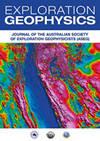台湾吸积楔海底斜坡地震去多重策略
IF 0.8
4区 地球科学
Q4 GEOCHEMISTRY & GEOPHYSICS
引用次数: 0
摘要
减少反射地震数据中的多重污染仍然是海洋地震数据处理的主要挑战之一。除地质环境外,其效果还取决于多种去除方法。在这项研究中,我们采用了两个传统的二维多通道地震数据,穿过台湾西南部的吸积楔,以测试各种多重衰减场景的效率。该构造域是由南海北部裂陷边缘与吕宋火山弧的早期弧陆碰撞形成的。楔形从浅水延伸到深水水深,从而促进了地震记录中的短周期和长周期倍数。在不同的海底水深和构造区域,测试了一系列去多重方法来衰减多重能量。第一步依赖于倍数的周期性。在x-t域中进行空间相关的预测反卷积以衰减混响并提高时域的时间分辨率。采用波方程多重衰减(WEMA)方法,通过水层数值波外推与水底反射率相结合,抑制水层多重。地面相关多重消除(SRME)旨在通过假设在可能的地面多重反射位置通过叠前地震迹线的卷积可以运动学预测地面相关多重,从而减弱残余水底多重和leg多重。第二步利用原色和倍数之间的空间移出差异行为。抛物Radon通过在τ-p域中减去噪声能量来变换远偏移倍数,而频率波数(F-K)滤波器旨在消除F-K域中的任何剩余倍数能量。预测反褶积提高了大陆坡和下楔坡的地震分辨率,抑制了海底混响能量,但对上楔坡没有作用。WEMA、Radon滤波器和F-K滤波器在大陆坡和楔形坡均降低了能量的倍数;而SRME对这两个领域的影响微乎其微。由于反射地震数据集涉及不同的构造环境和水深,因此没有一种单一的多重衰减方法能够在所有构造环境和水深测量中抑制多重。本文章由计算机程序翻译,如有差异,请以英文原文为准。
Seismic de-multiple strategy in the submarine slope of Taiwan accretionary wedge
Reducing multiple contaminations in reflection seismic data remains one of the primary challenges in marine seismic data processing. Besides geological settings, its effectiveness is also dependent on the multiple removal methods. In this study, we undertook two legacy 2D multi-channel seismic data crossing the accretionary wedge off SW Taiwan to test the efficiency of various multiple-attenuation scenarios. The tectonic domain has resulted from the incipient arc-continent collision between the northern rifted margin of the South China Sea and the Luzon volcanic arc. The wedge extends from shallow water to deep water bathymetries, hence promoting both short-period and long-period multiples within the seismic records. A cascade of de-multiple methods was tested to attenuate multiple energy under various seafloor bathymetry and tectonic areas. The first step relies on the periodicity nature of multiples. Spatial dependent predictive deconvolution in the x-t domain was performed to attenuate reverberations and improve temporal resolution in the time domain. Wave-equation multiple attenuation (WEMA) was applied to suppress the water layer multiples based on a combination of numerical wave extrapolation in the shot domain through water layer and water bottom reflectivity. Surface-related multiple elimination (SRME) aimed to attenuate the residual water bottom multiple and peg-leg multiple by assuming surface-related multiples can be kinematically predicted via convolution of pre-stack seismic traces at possible surface multiple reflection locations. The second step exploits the spatial move-out difference behavior between primaries and multiples. Parabolic Radon transforms far-offset multiples by subtracting noise energy in the τ-p domain, whereas the frequency-wave number (F-K) filter aimed to eliminate any residual multiples energy in the F-K domain. Predictive deconvolution improved seismic resolution and suppressed sea-bottom reverberation energy in the continental and lower wedge slopes, but not in the upper wedge slope. WEMA, Radon filter, and F-K filter reduced multiples energy both at the continental slope and wedge slope; whereas SRME made minimal impact on both areas. Since the reflection seismic datasets stretch diverse tectonic environments and water depth, there was no single multiple attenuation method capable to suppress multiples in all tectonic environments and bathymetry.
求助全文
通过发布文献求助,成功后即可免费获取论文全文。
去求助
来源期刊

Exploration Geophysics
地学-地球化学与地球物理
CiteScore
2.30
自引率
0.00%
发文量
33
审稿时长
>12 weeks
期刊介绍:
Exploration Geophysics is published on behalf of the Australian Society of Exploration Geophysicists (ASEG), Society of Exploration Geophysics of Japan (SEGJ), and Korean Society of Earth and Exploration Geophysicists (KSEG).
The journal presents significant case histories, advances in data interpretation, and theoretical developments resulting from original research in exploration and applied geophysics. Papers that may have implications for field practice in Australia, even if they report work from other continents, will be welcome. ´Exploration and applied geophysics´ will be interpreted broadly by the editors, so that geotechnical and environmental studies are by no means precluded.
Papers are expected to be of a high standard. Exploration Geophysics uses an international pool of reviewers drawn from industry and academic authorities as selected by the editorial panel.
The journal provides a common meeting ground for geophysicists active in either field studies or basic research.
 求助内容:
求助内容: 应助结果提醒方式:
应助结果提醒方式:


